

With the rapid ageing of the world’s population, As the elderly population grows... A book on Aging. Cognitive Aging, Dementia, and the Future of an Aging Population - Future Directions for the Demography of Aging - NCBI Bookshelf. A frightening aspect of ageing. What Is Cognitive Decline? - Definition, Causes & Symptoms - Video & Lesson Transcript. Is cognitive decline inevitable? Ageing Brain. Mild cognitive impairment. Loss of Cognitive Function. Dementia. Severe dementia. What is Cognitive Health? Why promote Cognitive Health? Strategies.
Maintaining cognitive health in an ageing society. What is "Staying Active"? What can promote Cognitive Health? What Does Being Active Mean to You? As part of the Active Lifestyle contest, we asked customers ‘What does being active mean to you?’
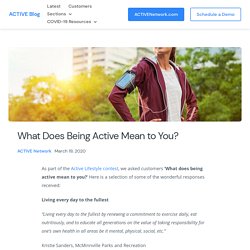
Here is a selection of some of the wonderful responses received: Living every day to the fullest “Living every day to the fullest by renewing a commitment to exercise daily, eat nutritiously, and to educate all generations on the value of taking responsibility for one’s own health in all areas be it mental, physical, social, etc.” Kristie Sanders, McMinnville Parks and Recreation Challenge every individual “Our community now has the opportunity to be active “up in the air” on our new high ropes course. Laura Nickel, Durham Parks and Recreation Allow your body to practice “Being active means allowing your body to “practice” breathing, stretching, and lifting. Robert Cepin, Hanover Township Park & Recreation Get fit. “Having an active lifestyle creates a sense of self-worth, accomplishment, better health, and brighter future and overall gives me a more positive outlook on life. 7 Expert Tips to Help Retirees Stay Active, Healthy, and Connected During Quarantine.
Promoting cognitive fitness. Think You're Too Old to Learn New Tricks? Two years ago, Bob and Jane knew nothing about beekeeping.
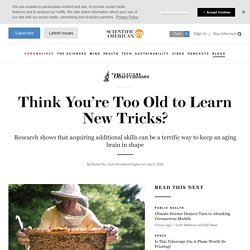
But they scoured books, blogs and research articles. They joined online and community beekeeping groups and watched YouTube videos. They shadowed master beekeepers. They created their own syllabus for what they needed to learn, and assigned themselves homework. Eventually, they formed their own beekeeping groups to help others set up their colonies. Should we be surprised that Bob and Jane aren’t in their 20s or 30s, but rather in their late 50s? We shouldn’t. These experiences should be celebrated. Keep exercising: New study finds it's good for your brain's gray matter. Cardiorespiratory exercise -- walking briskly, running, biking and just about any other exercise that gets your heart pumping -- is good for your body, but can it also slow cognitive changes in your brain?
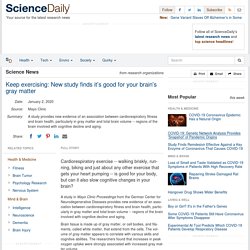
A study in Mayo Clinic Proceedings from the German Center for Neurodegenerative Diseases provides new evidence of an association between cardiorespiratory fitness and brain health, particularly in gray matter and total brain volume -- regions of the brain involved with cognitive decline and aging. Brain tissue is made up of gray matter, or cell bodies, and filaments, called white matter, that extend from the cells. The volume of gray matter appears to correlate with various skills and cognitive abilities. The researchers found that increases in peak oxygen uptake were strongly associated with increased gray matter volume.
The study involved 2,013 adults from two independent cohorts in northeastern Germany. Dr. Dr. Dr. Staying Active as You Age Boosts Brain Function. According to preliminary research, staying active as you age—even at a low intensity—can lead to better brain function and a lower risk of cognitive decline and dementia.Older people who remain active had larger total brain volume compared to those who reported lower amounts of activity.
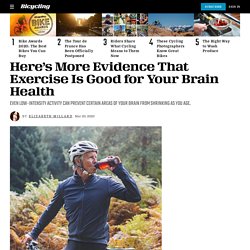
Older people who stay active—even at a low intensity—may have bigger brains than those who are more sedentary. This preliminary research was scheduled to be presented at the American Academy of Neurology’s annual meeting on April 25, but the meeting was canceled due to the global coronavirus outbreak. Using magnetic resonance imaging (MRI) scans, researchers looked at 1,557 people with an average age of 75. Steps to Prevent Dementia May Mean Taking Actual Steps. To ward off age-related cognitive decline, you may be tempted to turn to brain training apps.
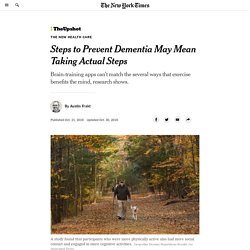
Last year, consumers spent nearly $2 billion on them, some of which claim to improve cognitive skills. Evidence suggests you’d be better off spending more time exercising and less time staring at your phone. This year the World Health Organization released evidence-based guidelines on reducing risks of cognitive decline and dementia. Although it pointed to some systematic reviews that reported positive cognitive effects of brain training, the W.H.O. judged the studies to be of low quality. Among the studies’ limitations is that they measure only short-term effects and in areas targeted by the training. Preventing Dementia by Keeping Active. Dementia is not a single disease; rather, it encompasses a spectrum of symptoms associated with a decline in memory.
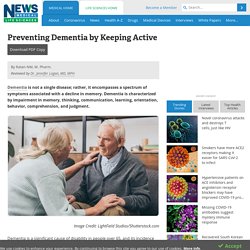
Dementia is characterized by impairment in memory, thinking, communication, learning, orientation, behavior, comprehension, and judgment. Image Credit: LightField Studios/Shutterstock.com. How Managing Diet, Exercise, and Hearing Loss Lowers Alzheimer’s Risk. Most people with Alzheimer’s disease are 65 years and older.
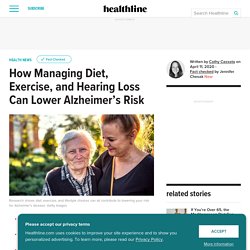
The risk doubles every 5 years after age 65.Age, family history, genetics, and lifestyle choices all contribute to the risk of Alzheimer’s disease.Studies show that exercising and eating a Mediterranean diet can reduce the risk of cognitive decline. The concern of developing Alzheimer’s disease can make brain health products and interventions appealing. However, with a surge of these products on the market, knowing which are scientifically proven to be safe and effective is challenging. “Be skeptical, because the FDA [Food and Drug Administration] allows all kinds of stuff on the shelf and tens of billions of dollars are spent every year on supplements that don’t have to have good evidence to be sold as long as they are safe in the doses that are being sold,” Dr. Howard Fillit, founding executive director and chief science officer of the Alzheimer’s Drug Discovery Foundation (ADDF), told Healthline.
“You can get any gene. Aerobic exercise training linked to enhanced brain function: Regular aerobic exercise may decrease the likelihood of developing Alzheimer's disease. Individuals at risk for Alzheimer's disease (AD) because of family history or genetic predisposition who engaged in six months of aerobic exercise training improved their brain glucose metabolism and higher-order thinking abilities (e.g., planning and mental flexibility) called executive function; these improvements occurred in conjunction with increased cardiorespiratory fitness.
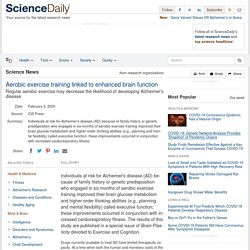
The results of this study are published in a special issue of Brain Plasticity devoted to Exercise and Cognition. Drugs currently available to treat AD have limited therapeutic capacity. At a time when both the human and monetary costs of the disease are projected to rise dramatically in the coming decades, there is a critical need to provide individuals with readily-deployable strategies that can decrease the likelihood of acquiring the disease or slow its progression.
The study investigated 23 cognitively normal, relatively young older adults with a family history or genetic risk for AD. Protecting mental health is important for healthy cognitive aging. Fluid Intelligence vs. Crystallized Intelligence. When you think about intelligence, what sort of things comes to mind?
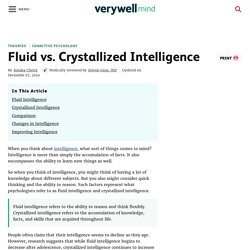
Intelligence is more than simply the accumulation of facts. It also encompasses the ability to learn new things as well. So when you think of intelligence, you might think of having a lot of knowledge about different subjects. But you also might consider quick thinking and the ability to reason. Such factors represent what psychologists refer to as fluid intelligence and crystallized intelligence. Successful aging. Enrichment Effects on Adult Cognitive Development. Cognitive Functioning Differences Between Physically Active and Sedentary Older Adults - IOS Press. Abstract Older adults engaging in regular physical activity can help create a buffer toward cognitive decline.
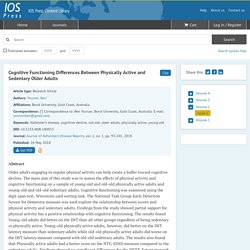
The impact of leisure activities on older adults’ cognitive function, physical function, and mental health. Abstract Engagement in leisure activities has been claimed to be highly beneficial in the elderly. Practicing such activities is supposed to help older adults to preserve cognitive function, physical function, and mental health, and thus to contribute to successful aging. We used structural equation modeling (SEM) to analyze the impact of leisure activities on these constructs in a large sample of Japanese older adults (N = 809; age range 72–74).
The model exhibited an excellent fit (CFI = 1); engaging in leisure activities was positively associated with all the three successful aging indicators. These findings corroborate previous research carried out in Western countries and extend its validity to the population of Eastern older adults. Effects of Exercise on Cognitive Abilities of Older Adults. Aging and cognitive abilities. Activities for brain health: It’s the variety that counts. Individuals who participate in a variety of activities are likely to have better cognitive abilities than those who do not, according to a recent study. Although the research has limitations, the findings warrant further investigation. Although it is not inevitable, cognitive decline is often associated with advancing age. As adults in the Western world live increasingly long lives, understanding how to preserve and nurture the brain’s function becomes ever more important.
Over the years, studies have shown that both physical and cognitive activity correlate with improved cognitive performance. On the other side of the coin, research has demonstrated that individuals who spend long periods doing more passive activities, such as watching television, are more likely to experience steeper cognitive decline. 5 Ways To Challenge Your Mind And Stay Youthful. As we get older, our cognitive abilities start to decline. It becomes essential to stay active and keep ourselves mentally fit.
It’s common knowledge that you need to exercise to keep your body healthy. Mind tricks: Do puzzles, brain games really keep older minds sharp? - Lifestyle - Akron Beacon Journal - Akron, OH. Many older adults enjoy “brain games” such as crosswords, sudoku and computer brain-training games. But can they help improve memory? Well, it’s complicated.Sudoku, crossword puzzles and other brain teasers can bring relaxation at the end of a long day or jump-start the morning over a cup of coffee.Some people might also use the games to keep their minds sharp as they get older, though the verdict is mixed on whether games have long-term brain benefits.Aging experts explain that there’s absolutely no harm in doing puzzles (jigsaw included) or other so-called brain games.
Though the games stimulate the brain in important ways, there are other more beneficial and scientifically proved ways to improve brain health, such as physical activity, nutrition and social engagement, they say. “I wouldn’t tell anyone, ‘Don’t do sudoku. Want to add more life to your years? Social connections are key. When we’re young, we expect to live forever. It’s easy to stay focused on the present and avoid thinking about a reality that we all inevitably face – aging. But in our later years, we become aware of how everyday actions can contribute to a more fruitful life.
Fostering social connections is one key to healthy aging, which is why Humana is sponsoring Active Aging Week, Oct. 1-7, a celebration of active living. The theme this year is “Redefining Active” which is designed to highlight how being active throughout the years means staying physically, emotionally and socially engaged. Sports and Exercise at Every Age. 20s – When you’re in your 20s, your body is strong and resilient. This is the perfect time to build a foundation of fitness.
Develop exercise as a habit. Make it a regular part of your life. Aerobic Exercise May Protect Aging Brains from Dementia Symptoms. A new study finds that aerobic exercise may help combat changes in the brain associated with dementia.But any kind of exercise is associated with a decreased risk of developing Alzheimer’s disease or dementia. Physical Activity and Older Adults. Untitled. Exercise boosts function in older adults. Looking at cardiovascular, power and strength training. We're all getting older.
Tailor your exercise to fit your age, Lifestyle News. Does age matter when it comes to exercise? According to doctors, it can have an impact on the type of workouts you do. Untitled. Untitled. Promotion of cognitive health through cognitive activity in the aging population. How to stay active physically, mentally while sheltering in place Vitality Active Seniors theoaklandpress. Cognition and Healthy Brain Aging Video – Brigham and Women’s Hospital. Healthy Aging: Promoting Well-being in Older Adults.